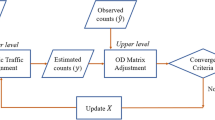Abstract
Different methods exist for the estimation of trips in public transportation systems based on automatized fare collection data. Some of the widely adopted estimation strategies are based on the traceability of passenger transfers. They may be effective in large cities, but fall short for trip estimation of single-routes, which are mostly the case in small-to-medium cities. We present a model to estimate the Origin-Destination Matrix, independent of transfers and passenger identification, using only boarding and alighting counts. The model is based on a system of linear diophantine equations, together with a method that computes the general solution and reduces the evaluation space, achieving useful estimations in polynomial time.
Access this chapter
Tax calculation will be finalised at checkout
Purchases are for personal use only
Similar content being viewed by others
References
De Dios Ortúzar, J., Willumsen, L.G: Modelos de transporte. Vasa (2008)
Munizaga, M.A., Palma, C.: Estimation of a disaggregate multimodal public transport Origin-Destination matrix from passive smartcard data from Santiago, Chile. Transp. Res. Part C Emerg. Technol. 24, 9–18 (2012)
Munizaga, M., Devillaine, F., Navarrete, C., Silva, D.: Validating travel behavior estimated from smartcard data. Transp. Res. Part C Emerg. Technol. 44, 70–79 (2014)
Pelletier, M.-P., Trépanier, M., Morency, C.: Smart card data use in public transit: a literature review. Transp. Res. Part C Emerg. Technol. 19(4), 557–568 (2011)
Trépanier, M., Tranchant, N., Chapleau, R.: Individual trip destination estimation in a transit smart card automated fare collection system. J. Intell. Transp. Syst. Technol. Plann. Oper. 11(1), 1–14 (2007)
Barry, J., Newhouser, R., Rahbee, A., Sayeda, S.: Origin and destination estimation in new york city with automated fare system data. Transp. Res. Rec. J. Transp. Res. Board 1817, 183–187 (2002)
Nagy, V.: Theoretical method for building OD matrix from AFC data. Trans. Res. Procedia 14, 1802–1808 (2016)
Lazebnik, F.: On systems of linear Diophantine equations. Math. Mag. 69(4), 261–266 (1996)
Author information
Authors and Affiliations
Corresponding author
Editor information
Editors and Affiliations
Rights and permissions
Copyright information
© 2017 Springer International Publishing AG
About this paper
Cite this paper
Cura, R.R., Stickar, R., Delrieux, C., Tohmé, F., Ordinez, L., Barry, D. (2017). Modeling the Origin-Destination Matrix with Incomplete Information. In: Ochoa, S., Singh, P., Bravo, J. (eds) Ubiquitous Computing and Ambient Intelligence. UCAmI 2017. Lecture Notes in Computer Science(), vol 10586. Springer, Cham. https://doi.org/10.1007/978-3-319-67585-5_13
Download citation
DOI: https://doi.org/10.1007/978-3-319-67585-5_13
Published:
Publisher Name: Springer, Cham
Print ISBN: 978-3-319-67584-8
Online ISBN: 978-3-319-67585-5
eBook Packages: Computer ScienceComputer Science (R0)




